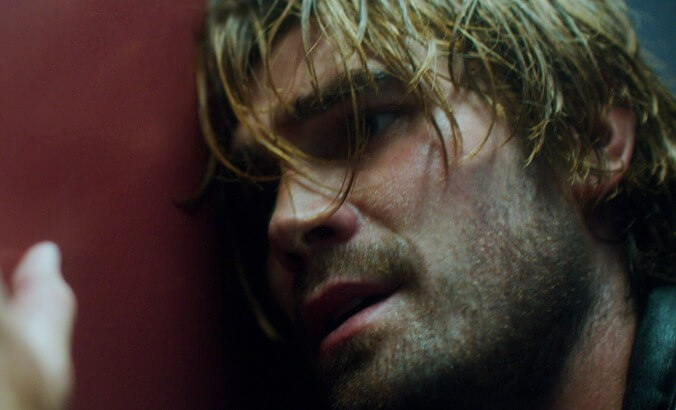The first movie inspired by the pandemic is here, and it sucks


If nothing else, the pandemic has separated the true constants from the variables. We know now what an America apocalypse will look like. There will be no overgrown highways, no roving motorcycle gangs. Instead, militarized cops and sheriff’s deputies will fight jurisdictional turf wars for the right to shoot you for jaywalking. Masses of the dead will be buried in caskets delivered by Amazon. The only entertainment will be Disney casting news. In Congress, the liberal wing will descend into internal squabbling about how to best honor the memory of John McCain.
Compared to the kind of grotesque potentialities that don’t require any change of present social order, the mid-2020s future envisioned in Adam Mason’s low-budget sci-fi item Songbird seems simple. The country has been ravaged by another pandemic: the more lethal COVID-23. Los Angeles is under permanent lockdown, and daily health checks are mandatory, the sick carted off to the ominous Q-Zone by armed sanitation workers in yellow hazmat suits. Only a small number of the blessedly immune are allowed out in the streets, leading to a lucrative black market in counterfeit immunities. We already know that we’re dealing with an alternate reality here, because whatever our nightmare will be, it isn’t going to involve a totalitarian public health infrastructure.
Not that any thought has gone into this film. Shot in July, it has the dubious honor of being the first American movie to come out of the pandemic—the first to be conceived, filmed, and released in the current climate. That it happens to have been produced under the imprimatur of Michael Bay dangles the possibility of poor taste, but unfortunately, bombast and conspicuous consumption are nowhere to be found. In fact, Songbird looks like any other unexceptional direct-to-streaming title, with a few warehouse-industrial locations and a supporting cast of familiar (and presumably very available) faces who spend most of the movie Steven Seagal-style, sitting in place.
KJ Apa (a.k.a. Riverdale’s Archie) stars as Nico, a virus-immune bicycle courier whose days mostly consist of delivering packages to various fortified Beverly Hills compounds for his boss, Lester (Craig Robinson), and chatting with Sara (Sofia Carson), the girlfriend he’s never actually met face to face. The reasons for this are pretty wonky. The film reiterates the idea that the immune can still get other people sick via particles on their hair and clothes, but since Nico never interacts with any of his customers (or anyone at all), there doesn’t seem to be much difference between immunity and being an asymptomatic carrier.
Regardless, it’s a metaphor, hewing to the rule that the most bogus speculative tomorrows are the ones that imagine that the biggest problem in the future is going to be loneliness or an inability to express our feelings—rather than, say, having said expressions taken over by data-gathering corporations that already owned a large chunk of our private lives before this whole thing began. It’s all about connection, as portrayed by a small, inelegantly juggled ensemble of housebound, alienated Angelenos.
Among these are Nico’s favorite customers, the ritzy Griffins: Piper (Demi Moore), who’s dealing in phony immunity passes, and her sleazy record-producer husband, William (Bradley Whitford), who has continued carrying on an affair during the pandemic, venturing out with an air tank, burning his clothes when he returns. As a possible cartoonish parody of the modern elite, this is a lot more interesting than anything that happens with the blandly attractive romantic leads. But it becomes clear early on that, despite its cheap thriller trappings, the film is headed only in the blandest direction, basically a love story of the kind traditionally told in commercials for tech companies and phones.
This isn’t enough to sustain five minutes of video, let alone a feature, so Mason fills the rest with footage of Nico biking around (which also looks kind of like an ad) and throws in some artificial stakes, which come by way of Peter Stormare, who hams it up with maximum volume and spittle as an immune, Gestapo-esque inspector for the all-powerful Department Of Sanitation. (Not that it matters much, but Los Angeles doesn’t have a Department Of Sanitation; it has a Sanitation Bureau.)
Watching Stormare attempt to yell the movie awake is about as close to entertainment as it gets, apart from the occasional cringe factor exemplified by the film’s curtain line, “We weren’t just delivering packages—we were delivering hope.” To be honest, it’s surprising that it’s taken this long for such an example of cash-in pandemic-sploitation to arrive. If there’s a warning to be heeded here, it’s this: The next one might be worse.